Justice Brian Cottle court will today (Friday) sentence five Vermont men convicted of the July 20, 2016 murder of Union Island resident Kamau Jones, in Vermont.
The men, Bridon Joseph, 39, Shemai Joseph, 31, Courtney Joseph, 34, Lennox Andrews, 29, and Andres Cuffy, 27, will be sentenced 16 days after their lawyers attempted to convince the court that while the killing was a group activity, it was not gang-related.
They will also be sentenced on one count of possession of firearm with intent to commit murder, after a trial in which Assistant Director of Public Prosecution Tammika Da SIlva -Mc Kenzie appeared on behalf of the Crown.
Mitigating on behalf of their respective client at High Court No. 1, on April 13, Ronald “Ronnie” Marks, Patina Knights, Duane Daniel, Israel Bruce, and Euchrista St Hilaire Bruce-Lyle, each told the court that there was not a significant degree of planning of the murder.
The Crown is arguing that much planning was involved, that Jones was tortured and suffered before he died, and has urged the court to begin with a sentence of 40 years in prison for each of the defendants.
However, Marks told the court that Malcolm Pollin “the leader of this operation, formed this plan on the trot.
“He saw the man [and said], ‘All I want is a cutlass — as contained in the evidence of Andrews,” Marks said.
Pollin, who was also charged with murder in connection with Jones’ death, was freed on Feb. 27, 2017 and was shot and killed in Vermont two weeks later.
Rillan Hill resident Schemel “Jacket” Dunbar is awaiting trial for murder in connection with Pollin’s death.
Mark Weekes, 32, who was also charged with James’ murder, was also freed on Feb. 27, 2017, when the preliminary inquiry was about to commence.
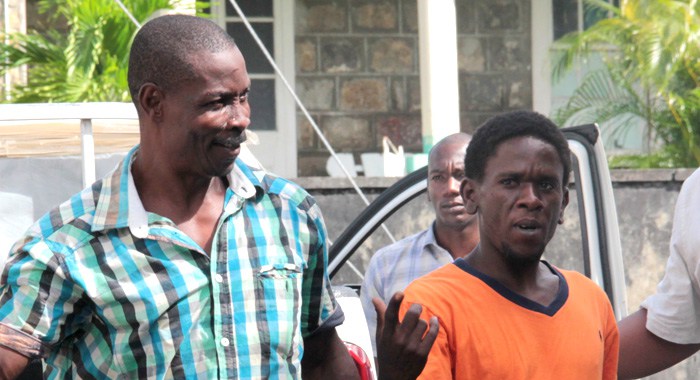
‘difficulties of poverty’
Marks told the court that Brydon’s father migrated before he was born. His mother migrated to Barbados, when he was 2, leaving him and his infant brother with his grandmother, Alberta Joseph, along with cousins and his older sister.
“That seems to be a common thread in the matters involving murder today. Persons growing up basically on his own without parental supervision and left to the whims of the world,” he said on a day when the court sentenced Etson Timm, 26, to 31 years in jail for murder.
He said Brydon’s grandmother ensured he attended secondary school.
“Not only was he faced with difficulties of poverty but suffered with sickle cell anaemia, which prevented him from participating fully in school activities as he was very often ill.”

The lawyer said those circumstances forced Brydon to leave the Buccament Primary School at senior 1
He went into farming when he left school and worked in the construction industry as a labourer.
Over the years, Bridon improved his skills and got a job in Canouan, where he worked for several years, before working on the construction of Buccament Bay Resort.
He sold from an icebox on weekends and special occasions, and was doing this at the time of the crime.
He has two daughters, aged 7 and 10. They live with their mothers, and Brydon supported them up to the time of his arrest.
The lawyer said that while he had read the Crown’s submissions on sentencing, the defence did not have the benefit of the reasoning of the jury and had to piece the facts together from the evidence adduced at trial.
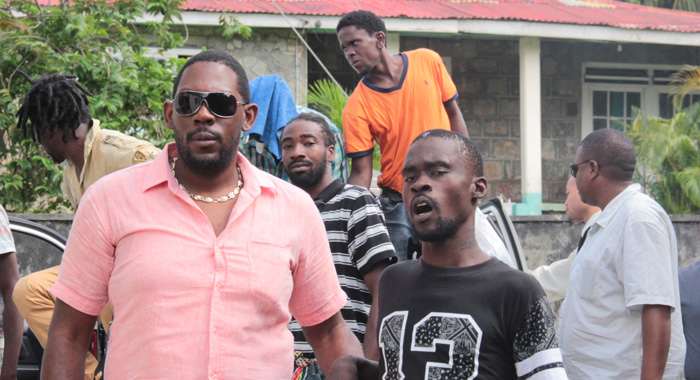
‘excellent prospect for rehabilitation’
Meanwhile, Daniel told the court the Crown’s submissions support the position that Shemai Joseph is an excellent prospect for rehabilitation.
The lawyer asked the court to begin with a starting point of 25 years in prison with a range of 15 to 35 years, rather than 40 years, as the Crown suggested.
He said that while the murder involved the use of a firearm, there is no evidence that Shemai saw a firearm or bladed instrument prior to the commencement of the offence nor that he travelled with the group in possession of the weapon.
He said that the evidence was that the person identified as Shemai seemed confused and held his hands on his head.
Daniel said there was no evidence that his client was involved in the planning of the offence.
The victim, the lawyer said, was living in a well-populated community and, therefore, was not geographically isolated.
Daniel said that the offence occurred at a home where a young child lived but was not committed in the presence of a third party or young children.
He said there was no evidence of torture, adding that the doctor, under cross-examination, could not determine which of the injuries proved fatal.
Daniel said the killing appeared to be an organised activity, but there was no evidence that Shemai was part of the prior planning.
The lawyer said his client has no previous conviction, is relatively young, did not resist arrest or try to evade the police, and gave a statement.
He said Shemai’s father is a gardener and his mother a domestic worker.
He is his father’s only child, and the third of his mother’s five sons.
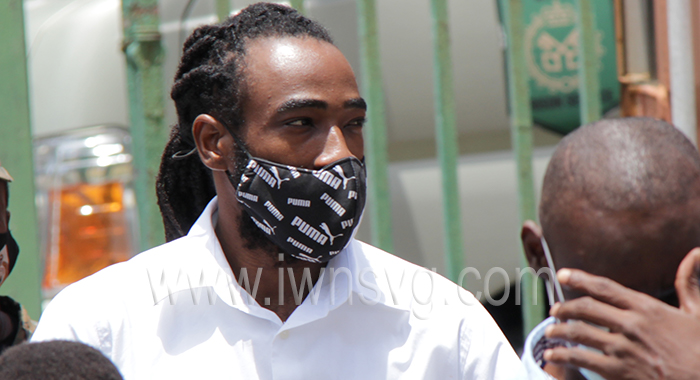
Shortly after Shemai was born, his parents’ relationship ended and his mother relocated to the Grenadines.
She migrated to the United States with her two youngest children when Shemai was 5.
Daniel told the court that Shemai was left in the care of his paternal grandmother, Vivian Mary Finch and his grandfather, both of whom lived in Vermont.
Shemai had little contact with his siblings and word about them came from his mother during her infrequent visit to St. Vincent.
“As such, Shemai did not benefit from the normative nuclear family, and his world was one which consisted of his upbringing with his grandparents,” Daniel told the court.
Shemai and his grandmother regularly attended the Anglican Church in Pembroke where he was confirmed and was an active part of the youth activities at church.
He attended the Buccament Government School but failed the Common Entrance Exams and superannuated.
He then attended the Multipurpose Technical Centre at Barrouallie where he remained for a further three years, exiting at age 16.
The lawyer told the court that Shemai’s grandparents were subsistence farmers and operated a convenience shop in Retreat, Vermont that sold foodstuff and fried chicken.
The shop was washed away in the 2013 Christmas floods and as reconstruction on the riverbank was later prohibited, “there was no opportunity to pursue that livelihood,” Daniel told the court.
Shortly thereafter, his grandfather died.
He said Shemai Joseph worked as a labourer when opportunities presented themselves and planted vegetables for sale on the family’s land. At the time of the offence he had been working for over a year doing gardening and landscaping for Brenda Punnett.
The lawyer said that before his incarceration, Shemai had intended to reinstate the shop elsewhere, start a landscaping business and use the funds from it to start a poultry farm on the back portion of his grandmother’s land to sell eggs and chicken.
“He was inspired to do so by a head teacher from Buccament Government School who operates a similar profitable business,” Daniel told the court.
Since his incarceration Shemai has volunteered to work in the prison bakery, and learned how to make bread, and cakes.
“He has signed up for a number of programmes while incarcerated but has been told that most are not available to persons on remand. One of his greatest regrets is that he is not there to assist his grandmother in her twilight years,” Daniel said.
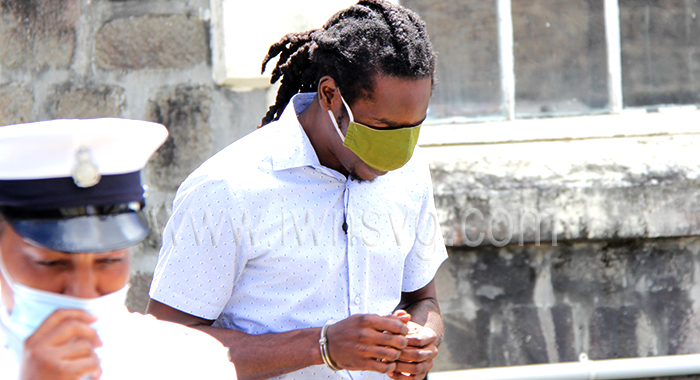
Son of a criminal
Mitigating on behalf of Courtney Joseph, Patina Knights told the court that he was born to Malcom Pollin and Nicole Joseph in Grenada.
Pollin brought Courtney to St. Vincent at age 2.
Courtney was placed in care of paternal grandmother and remained there until he was 12 or 13.
During his formative year, Courtney’s father paid next to no role in his life as he was in and out of prison. Courtney’s mother, who lived in Grenada, had no contact with him and parental guidance came from only his grandmother.
Knights said her client said that life was hard because of their economic status and whilst he attended Buccament Government School, it was very infrequent because he could not afford it.
Courtney completed primary school about age 14 or 15 and did not pursue secondary education.
When he was 12-13, he went to live with maternal grandmother, Alberta Barker. At age 12, his mother returned from Grenada and at that stage they developed a relationship.
When Courtney lived with Barker, life was better, they attended church and things were more comfortable, his lawyer said.
“He said that the lifestyle of his father impacted him negatively. People judged him because of who his father was. His mother repeatedly tried to warn him away from his father but he stated that he was his father and as a result, he showed him respect,” Knights told the court.
At 18, Courtney went to live on his own, stating that he would seek employment.
He farmed and worked at CWSA briefly and also on the construction of Buccament Bay Resort. At the time of the incident he was doing steelwork.
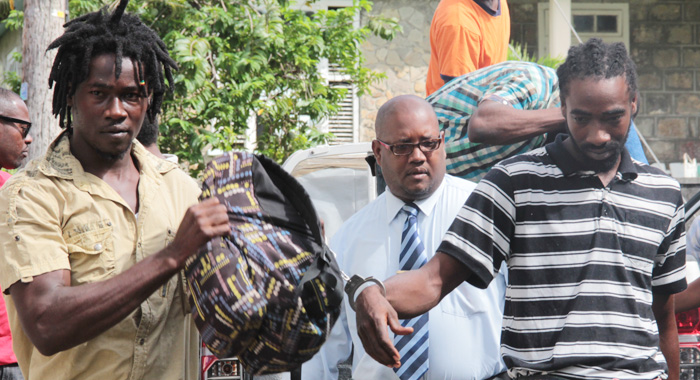
The lawyer disagreed with the Crown that the killing involved a significant degree of premeditation and planning.
She said that, as indicated by Marks, it was the same night that Pollin “came on the block stating that they should do this and they went thereafter”.
The lawyer further disagreed that there was evidence of Jones suffering or being tortured before he died.
She said that while it was a group activity and joint enterprise, the defence disagreed that it was an organised criminal activity.
Knights said her client has a previous conviction in relation to ammunition from a search warrant.
Mitigating on his behalf is that he is a good prospect for rehabilitation and was 28 at the date of offence. She mentioned his economic situation and his difficult childhood, relating to no parental guidance.
She said that Senior Prison Officer Pilgrim had suggested that counselling would help Courtney
He had spent 4 years, nine months and 18 days on remand as of April 13, 2022.
Regarding the firearm offence, Knight said aggravating was the fact that the forearm was not recovered and Jones died as a result of injuries.
She disagreed with the Crown that there was evidence of three firearms used in the killing and rebutted their submission that it was a gang activity.
“It is a group activity but not a gang activity,” Knight said, and argued that the starting point should be 75% of the maximum for the offence.
Acted as lookout

Meanwhile, Bruce, mitigating on behalf of Lennox Andrews, said that his client was 24 at the time of the crime.
He attended the Buccament Government School and the Campden Park Multipurpose Training Centre, after which he joined his father, Leslie Peters in farming.
Andrews later worked as a labourer on Buccament Bay Resort and then on Pinchers Blocks Farm.
During his “tender years” Andrews attended the Vermont SDA Church with his grandmother but did not spend much time doing so.
Bruce told the court that at the time of the crime, Andrews’ son was 6 and his daughter 8.
He noted that the five men were jointly charged with murder.
“Whereas Lennox Andrews, I presume for his own ignorance of the application of the law, thought that if he didn’t go but stand in a position to look out, is not involved, is wholly misplaced in law,” Bruce said, adding that the jury has found him guilty.
The lawyer said that the death penalty or whole life sentence was not applicable in the case and he disagreed with the Crown that 40 years is an appropriate starting point.
He said there was no significant degree of premeditation, no evidence of torture, but added that when violence is used to case death, there will be some degree of suffering before death.
The lawyer said that had it not been for the engagement of Andrews and his forthrightness, one could not say how or when the matter might have been resolved.
He said his client had no history of involvement in violent crimes, and his only conviction, for16 grammes of cannabis, a spent record.
Bruce said that his client was initially arrested by the police and released before he was finally charged.
In the intervening period, he did not offend or seek to interfere with witnesses or leave the jurisdiction, Bruce said, adding that these are points of mitigation, in addition to the fact Andrews has children aged 11 and 13.
The lawyer said that in Vincentian society, there is talk about children and the difficulties that they face.
Bruce said an issue that consistently comes up is the absence of fathers in home.
“We may say this is a father that found himself in the crosshairs of the law … the longer any sentence keeps him away from his children, the greater the effect of the absence and the society is likely to suffer which can have ripple effect for the Andrews family and all of St. Vincent and the Grenadines,” Bruce told the court.
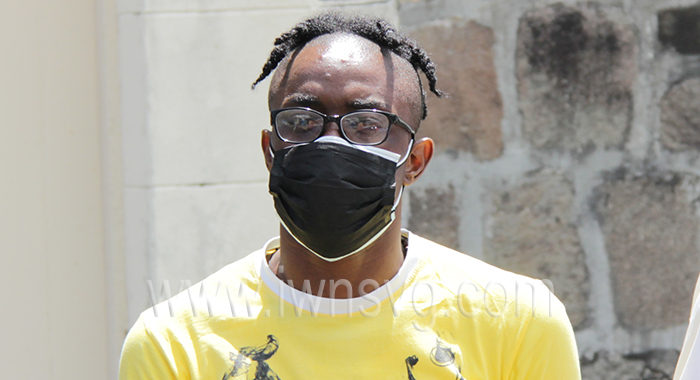
Shame surrounding theft ends schooling
Bruce-Lyle told the court that her client, Andres Cuffy attended the Buccament Government and Buccament Secondary schools, dropping out at form 2.
Shortly before quitting school, he was involved in an incident of theft of groceries and felt ashamed and that he had let his mother down.
Before then, he was doing well in school.
The lawyer said that since leaving school, Cuffy has not been an idle young man and took up gardening with his uncle.
Just before the crime, he was working at Bush Bar in Vermont, but before moving to Vermont, he lived in Barrouallie with his parents, who later broke up.
Cuffy’s mother later left and went to Barbados and returned permanently after his grandmother died in 2008.
Bruce-Lyle said that of the five men convicted of the murder, Cuffy is only close to Shemai, his cousin.
She said that Senior Prison Officer Pilgrim is of the view that Cuffy is a good candidate for rehabilitation because of his good upbringing.
The officer suggested counselling, as he gets depressed easily.
Bruce-Lyle agreed with the prosecution as regards the starting point for the murder charge because of the use of a firearm.
She, however, said the range should be 30 to 50 years, taking into account mitigating factors on behalf of Cuffy.
The lawyer noted that he was 21 at the time of the incident, had only two previous convictions, one when he was 14 and one when he was 19, both of which are spent.
She said he should be able to come out of prison and be reintegrated into society and should be credited for time spent on remand.
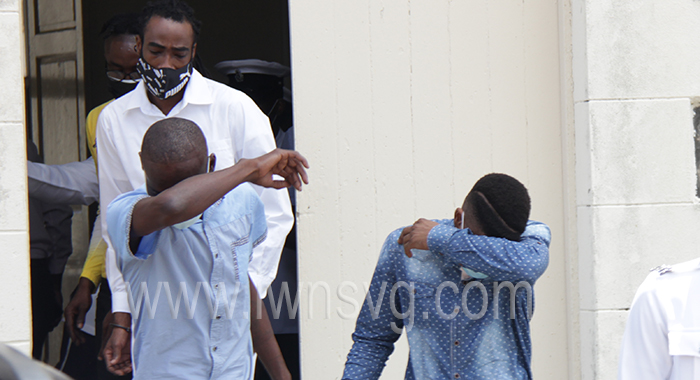
Bruce-Lyle, as with other counsel, disagree with Crown’s position regarding premeditation, vulnerability of the deceased, the offence occurring at home of elderly person and children, that there was evidence of suffering and torture, and that it was an organised criminal activity.
“I submit that none of those apply as aggravating factors in the way that they have them here,” Bruce-Lyle said of the Crown’s submission.
She said that the deceased was in the basement of a home, there was the use of a weapon, there were serious and multiple injuries, and the offence occurred in the basement of Belle Gordon’s home and not in public and not where there are young children.
As regards the firearm charge, following the guidelines, it appears that the matter falls within category 1 and the level A. However, there is the aggravating factor in that that firearm was not recovered, Bruce-Lyle said.
Regarding Cuffy, she said there are no aggravating factors and he has no previous conviction for firearm or ammunition offences.
The lawyer asked for concurrent sentences and that the court be mindful of the totality principle.




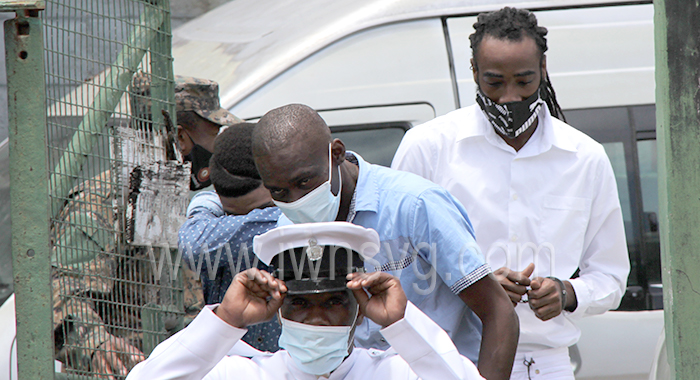


Lock them up, hit them with the maximum sentence. But knowing the comedy club Judiciary thëre will probably be another grave miscarriage of Justice again. I’m almost certain the cops did another half-ass investigation again and a compitent lawyer will punch holes in the case.
Then day wha fo fight police?
Why are lawyers always trying to justify crime? If there is a hell they have a special place there